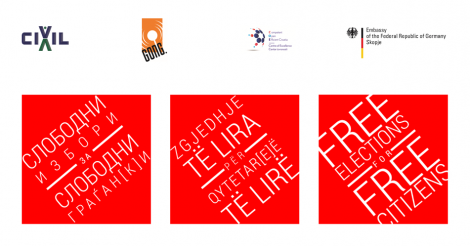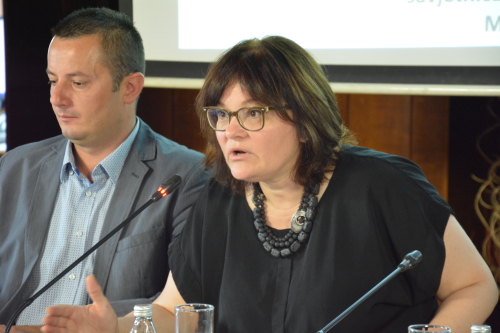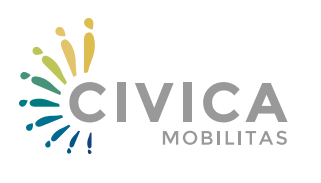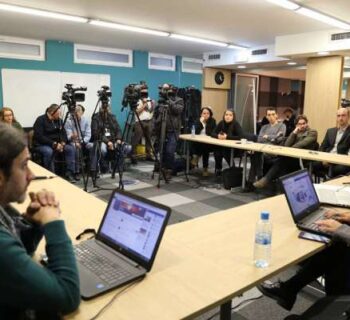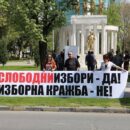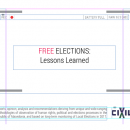- Second expert mission (17 – 20 November 2015)
The topic of our second mission in Macedonia was financing of election campaigns, with emphasis on the scope and contents, and control within the legal framework for regulating the above-mentioned issues. CIVIL’s members and associates gained further knowledge on the legal regulation concerning the financing of election campaigns and political parties in Croatia, as well as on international standards.
During the EU accession process, the Republic of Croatia adopted a qualitative legal framework for financing of election campaigns and political parties [1], which could also be useful in the Macedonian context. The exchange of experience and knowledge resulted in CIVIL’s concrete proposals on organizing and supervising the financing of the pre-election campaign and on the role of the SEC. The public meeting had significant media coverage, while at the closed meetings/workshops discussions were held with representatives of other civil society organizations, with representatives of political parties and experts dealing with the electoral process.
From the work with our colleagues and from the information we gathered during our visit, and the examination of the Voters Register, we believe that campaign spending limits need to be prescribed, and that this amount should be functionally, economically and ethically acceptable, having in consideration the social situation of the transition in which the Macedonian society and economy are in. Also, the need of having the control over the campaign financing entrusted to the SEC has to be considered, which it would conduct independently from the State Audit Office, with a clear demarcation in the competencies. It should be anticipated for the SEC to carry out the supervision in cooperation with other competent authorities (such as the Tax Administration, Ministry of Finance…). According to the information we have received, the SEC has about 120 employees as technical staff, which compared to the 14 technical employees in the State Electoral Commission of Croatia (a body that performs supervision on the financing of the campaigns), is quite a large number, and this without a doubt shows that it has sufficient human resources to perform supervision on the financing of campaigns and political parties, if there were to be a legal obligation and a clearly expressed political will. Also, the possibility of passing the control to another independent body needs to be considered, something that requires an appropriate political and public debate.
We have concluded that the regulation on the role of money in politics is a central issue of political agendas all over the world. The monitoring of the financing of campaigns must not remain a dead letter on paper, and the obligations of the participants in the elections have to be clearly regulated, along with the content and deadlines for submission of reports on campaign expenditures, and in this sense to develop the obligations of the body responsible for the supervision. The reports have to be reviewed by an independent body, and sanctions need to be provided for non-fulfillment of the obligations, which in Croatia are administrative and criminal.
The regulation of the financing of political parties is a basic precondition for a fair political competition, so for the success of the regulation it is not enough just to adopt laws, but there needs to be readiness to make these laws efficient, for which we believe Republic of Macedonia needs to make additional efforts. Nevertheless, this includes the adoption of high political standards of the leading political parties that will adopt them as their own views.
- Third expert mission (09 – 11 December 2015)
Our visit to CIVIL was focused on observation of elections, as well as on activities for planning and for the methodology for the period of observing the campaign, the day of the elections and the post-election period of the upcoming elections in Macedonia. In this area of work, our colleague Marina Skrabalo from GONG joined us, who as an excellent expert in the field of advocating policies shared her knowledge with her colleagues from CIVIL.
As part of the methodology for election observation, other civil society organizations were mapped that could contribute, in joint activities with CIVIL through connectivity and networking. In relation to the above-mentioned activities, we discussed the need of establishing an organizational structure for monitoring of the elections.
CIVIL’s members and associates have developed a plan of activities for observation of the pre-election period, the day of the elections and the post-election period. We analyzed the capacities of the organizations and developed a plan for cooperation with other civil society organizations in Republic of Macedonia to jointly observe the upcoming elections. According to the Macedonian political and legal context, a methodology has been developed for monitoring the electoral process and the awareness of the need for further training of all of CIVIL’s members for the electoral process. CIVIL’s members have become familiar in detail with the rights and obligations of the observers in all phases of the electoral process, and have also gained knowledge necessary to analyses the participants. Based on the existing capacities of CIVIL, a plan for their strengthening has been worked out, with the purpose of establishing a new structure that is necessary for the successful observation of all phases of the electoral process.
The experience of GONG with observers and observation of the electoral process in all of its phases represents a useful base for establishing plans for monitoring the elections and for the formation of CIVIL’s organizational structure in the monitoring of the upcoming elections in Macedonia. Also, we would like to emphasize that CIVIL has begun cooperation with representatives of other civil society organizations working on human rights and on the electoral process for possible joint election observation.
In regards to the elections media coverage, our hosts were presented with the “new” rules for electronic media with the national concession in Republic of Croatia during the election campaign. [2]. The application of the “old” rules [3] has led to situations where on campaign shows which according to existing rules last 50 minutes on Croatian television, a representative of a certain electoral list (if in the electoral unit there are 20 lists) is not allowed to speak for more than 2 minutes, and less than 1 minute in other shows on other media where rules provide a period of 20 minutes! Moreover, the obligations of the electronic media in the elections for members of the Croatian Parliament were too detailed, which prevents the expansion of space for free and creative mediation of journalists between the citizens and their interests and the candidates and their interests, and thus contributes to poor informing and educating of voters concerning the parties, their programs and candidates.
The new rules try to enable the best possible way of following the forms and time of monitoring the election propaganda. This, on the one hand, guarantees the participants in the elections equal treatment, and on the other, editors and journalists freedom in creating the shows while determining the minimum terms that each election candidate or electoral list can have.
The application of the principle of equity between parties and candidates in the electoral process is important. Equity has to be guaranteed, and for this purpose, the state needs to have e neutral view in regards to the: electoral campaign, the media, especially the state media and the financing of the parties and campaigns from the budget.
Depending on the case, equity can be strict or proportional. If equity of the political parties is proportional, then they must be treated according to the results achieved in the elections. Equity especially applies to the representation on radio/TV, on the budget funds and on other types of support [4].`
- Conclusion
With the implementation of this project we have tried to provide our expert assistance to our colleagues from CIVIL, so that the organization may further more establish itself as a relevant organization for protection of human rights, for promotion of transparency and for monitoring of the election process. We, most certainly, assess positevely the will of CIVIL and of the other organizations for further networking and for joint activities on improving the electoral legislation, on monitoring the electoral process and on preventing manipulations in the electoral context. Based on the exchange of knowledge and experience, CIVIL has gained new ideas, on how and what to advocate for in order to improve the electoral process in Macedonia.
(The end)
[1] Political Activity and Election Campaign Financing Act („Official Journal“, no. 24/11, 61/11, 27713 and 48/13-consolidated text)
[2] „Official Journal“, No 118/14
[3] „Official Journal“, No 165/03 and 105/07
[4] Code of good practice in electoral matters, guidelines and explanatory notes, Venice Commission, October 2002.
The expert team of CIVIL – Center for Freedom, within its regular activities, has prepared new, extensive legal-political analyses on the political situation, the crisis and the electoral process in Republic of Macedonia.
CIVIL’s associate, Aleksandra Jozic – Ilekovic (Republic of Croatia), a long-time vice president of the Croatian State Electoral Commission, has within the framework of the project “Support to CIVIL for raising its professional capacity and the development of the public-advocating policy in representing the election reforms in Republic of Macedonia), in January 2016 prepared an analysis on the application of Croatian examples for improving the electoral legislation in Macedonia, for the purpose of – preventing manipulations in the electoral process, which we have published in two sequels.
In February, CIVIL Media published in four sequels the analysis of Dr. Saso Ordanoski “Macedonia: The Land of Missed Democratic Opportunities”, and we are yet to publish the analysis of the attorney Sandra Gavrilovska.
Based on this analysis, as well as CIVIL’s analyses and recommendations, CIVIL will also make efforts in the following period to contribute to creating conditions for holding free elections and for overcoming the political crisis in Republic of Macedonia.
The analyses and recommendations that CIVIL has prepared in this period are part of the activities of the project “Free elections for free citizens”, supported by the Ministry of Foreign Affairs of Federal Republic of Germany.
This post is also available in: AlbanianMacedonian
 Македонски
Македонски Shqip
Shqip English
English
